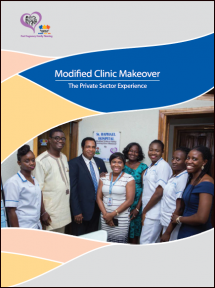Modified Clinic Makeover: The Private Sector Experience
The Post Pregnancy Family Planning (PPFP) project (2017-2021) aims to support private sector health providers to provide post-pregnancy clients with the information and services they require to commence the use of family planning services in Lagos State, Nigeria. The Project is funded by the Bill and Melinda Gates Foundation and MSD for Mothers.
The post-pregnancy period is defined as the period of pregnancy through one-year post-pregnancy and includes miscarriages and any pregnancy that does not result in a live birth. The project’s family planning activities are not standalone but rather integrated along the Maternal and Child Health (MCH) continuum of care services; antenatal, delivery, immunization, postnatal and any interaction the post-pregnancy client has with the healthcare system.
In Lagos State, the private sector provides maternal services to sixty-five percent of the citizens. Formative research revealed that majority of the post-pregnancy clients who patronize the health facilities for antenatal care, delivery, and immunization services are not being counselled on family planning. This is a missed opportunity and provides the occasion to reach women with quality family planning information and services during their multiple contacts with the healthcare system. The PPFP approach utilizes the proven-to-work Nigeria Urban Reproductive Health Initiative (NURHI) Project model which focuses on service delivery, advocacy, and demand generation through a sustainability lens.
This document focuses on the innovation of 72-hour makeover – a concept initially conceived by the Nigeria Urban Reproductive Health Initiative (NURHI) project primarily for the public sectorand how it was modified for use in the private sector. Within the private sector context, the activity involves co-implementation with private sector providers to upgrade the physical environment ( clinic structure and equipment) of the facility in line with the national standard for the provision of quality FP services.
The makeover aims to improve the quality of the family planning (FP) clinic setting, make the environment conducive for client-provider interaction, and improve the client experience and satisfaction. The methodology enhances collaboration between the Project and facility owners by encouraging cost-sharing and extension of the makeover process to other areas of Maternal and Child Health (MCH) services within the facilities. Till date, the Project has renovated 110 private health facilities, with 51 designated FP spaces.
Source: Post Pregnancy Family Planning Project, NURHI
Date of Publication: November 21, 2020
SIMILIAR RESOURCES
Tools
Examples
- Reaching First-Time Parents and Young Married Women for Healthy Timing and Spacing of Pregnancies in Burkina Faso
- Healthy Timing and Spacing Of Pregnancy: A Trainer’s Reference Guide
- Healthy Timing and Spacing of Pregnancy (HTSP) Online Course
- HTSP 101: Everything You Want to Know About Healthy Timing and Spacing of Pregnancy
- Healthy Timing and Spacing of Pregnancy Fact Sheet
- Family Planning Counselling Kit
- The HTSP Implementation Kit
- Accelerator Behaviors
- The Behavior Change Framework
- HTSP Online Course

